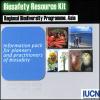Biosafety
Denying entry : opportunities to build capacity to prevent the introduction of invasive species and improve biosecurity at US ports

Trade and travel are the primary drivers of biological invasion both into and within the United States, and prevention measures have been identified as the most cost-effective means of minimizing the introduction and impact of invasive species. A recognized gap in the US governments knowledge of the role that trade has played in the introduction of invasive species into the US led to a study undertaken by the US Environmental Protection Agencys Office of International Affairs and IUCN.
Report from the regional public hearing workshop on GMO, Dhaka, Bangladesh, 12 February 2006

The Present Workshop Report compiles and summaries the papers, the discussions and the recommendations from the Regional Public Hearing Workshop held in Dhaka, Bangladesh 12 February 2006 and from the smaller Follow-Up Workshop 13 February 2006. The Workshop Reports has been compiled by Orbicon and IUCN Bangladesh. The papers are put in the report in the sequence, which would be natural for the reader, and not always in the order they were presented at the workshop.
Use of genetically improved and alien species for aquaculture and conservation of aquatic biodiversity in Africa

Organismes génétiquement modifiés et sécurité biologique : document d'information sur les questions liées aux OGM à l'intention des décideurs et d'autres acteurs

Genetically modified organisms and biosafety : a background paper for decision-makers and others to assist in consideration of GMO issues

Biosafety and genetically modified organisms (GMOs) are amongst the most complex of biodiversity issues: from species conservation, to sustainable livelihoods, to socio-cultural policy. The greatest GMO-related need shared by all decision-makers - governmental, civil society, and industrial - is for unbiased background information and a framework for evaluating new evidence.


